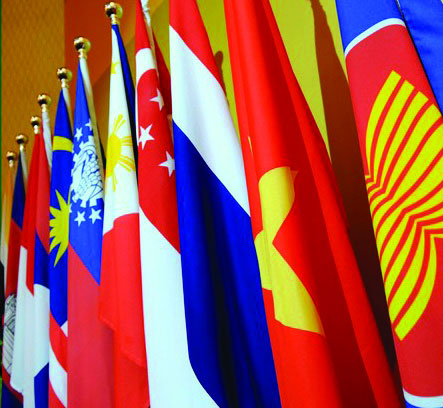 The Philippines hosted to the 12th General Assembly and Governing Council Meeting of ASEAN Law Association (ALA), which convened on February 25 to 28, 2015 at the Shangri-La Makati and on March 1 to 2, 2015 in Boracay.
The Philippines hosted to the 12th General Assembly and Governing Council Meeting of ASEAN Law Association (ALA), which convened on February 25 to 28, 2015 at the Shangri-La Makati and on March 1 to 2, 2015 in Boracay.
One key activity of the General Assembly was the Workshop on Alternative Dispute Resolution (ADR) held on February 26. The Workshop was chaired by Mr. Lawrence Boo of Singapore, with former PDRCI President Victor Lazatin as co-chair.
During the Workshop, the participants presented the leading paper with the theme Strengthening ADR Mechanisms for ASEAN Integration. Following this theme, other papers presented at the Workshop dealt with such topics as: Accessibility, Costs and Third-Party Funding, the Role of National Courts in ADR, Transparency and Ethics in ADR, ADR Options in Investment Disputes Other than ICSID Arbitration, and Online Dispute Resolution. A number of chief justices from all over the ASEAN countries attended the Workshop.
The ALA comprises Brunei, Indonesia, Cambodia, Malaysia, Myanmar, Singapore, Thailand, Vietnam, Laos, and the Philippines as member nations. This year’s ALA General Assembly has been called truly historic, considering that ALA has pioneered mutual cooperation among members of the legal profession in the ASEAN, initiated harmonization of laws, and fostered free trade and cross-border dispute resolution. The ALA is the only civil society organization for law expressly designated as an affiliate in the 2007 ASEAN Charter.
The 2014 IBA Guidelines on Conflicts of Interest in international arbitration
On 23 October 2014, the International Bar Association (IBA) Council adopted the 2014 IBA Guidelines on Conflicts of Interest in International Arbitration (“2014 Guidelines”) to address the evolution of the global practice of international arbitration, including a number of issues that have received attention in international arbitration practice since the IBA Guidelines were first issued in 2004 (“2004 Guidelines”).
The 2014 Guidelines were drafted by the IBA Conflicts of Interest Subcommittee (“IBA Subcommittee”) composed of 27 arbitrators and arbitration practitioners based on the accumulated experience of parties and arbitration practitioners since that time. A review of the 2004 Guidelines was initiated in 2012 with the view that the Guidelines will “continue to be the leading reference point for parties, arbitrators and institutions on conflicts of interest issues and indeed reflect any new issues and concerns that may have arisen since their development.”
While the 2014 Guidelines were intended to address a number of issues, they do not substantially deviate from the 2004 Guidelines. Instead, the 2014 Guidelines made certain refined changes to address uncertainties as to their application and reflect the evolving standards and complexity in the analysis of disclosure and conflict of interest issues.
Several issues were also revisited, such as the “effects of so-called ‘advance waivers’, whether the fact of acting concurrently as counsel and arbitrator in unrelated cases raising similar legal issues warrants disclosure, ‘issue’ conflicts, the independence and impartiality of arbitral or administrative secretaries, and third-party funding.” The 2014 Guidelines also sought to clarify that the Guidelines apply to both commercial and investment arbitration, and to both legal and non-legal professionals serving as arbitrators.
The 2014 Guidelines likewise emphasize that the requirement of disclosure does not per se imply the existence of doubt as to the impartiality or independence of the arbitrator. However, disclosure is now required for certain circumstances not contemplated in the 2004 Guidelines. Some of the key revisions are:
1. The arbitrator bears the identity of the firm.
 General Standard 6(a) of the 2014 Guidelines provides new language by expressly stating that the “arbitrator is in principle considered to bear the identity of his or her law firm.” However, it maintains that “the fact that the activities of the arbitrator’s firm involve one of the parties shall not necessarily constitute a source of such conflict or a reason for disclosure.” This new
General Standard 6(a) of the 2014 Guidelines provides new language by expressly stating that the “arbitrator is in principle considered to bear the identity of his or her law firm.” However, it maintains that “the fact that the activities of the arbitrator’s firm involve one of the parties shall not necessarily constitute a source of such conflict or a reason for disclosure.” This new
language suggests that assessments must be made on a case-by-case basis where the “relevance of the activities of the arbitrator’s law firm, such as the nature, timing and scope of the work by the law firm, and the relationship of the arbitrator with the law firm” ought to be considered. [General Standard (6)(a) Explanation].
The IBA Subcommittee further explains that this standard endeavors to strike a balance between the interest of the parties to appoint the arbitrator of their choice, who may be a partner at a large law firm, and the effective implementation of the duty of impartiality and independence of all arbitrators.
2. Parties who have third-party funding arrangements must disclose the existence of such funding. Under the 2004 Guidelines, when a party is a legal entity, its managers, directors or embers of its supervising board are “considered to be the equivalent” of such legal entity (see General Standard 6[c]).
The 2014 Guidelines extend the coverage of persons or entities which are “considered to bear the identity” of a party to those who have “direct economic interest in, or a duty to indemnify a party for, the award to be rendered in the arbitration” [see General Standard 6(b)]. The 2014 Guidelines explain that, in light of thisrevision, “third-party funders” or “insurers in relation to the dispute,” i.e., person or entity that is contributing funds, or other material support, to the prosecution or defense of the case and that has a direct economic interest in, or a duty to indemnify a party for, the award to be rendered in the arbitration, now bear the identity of a party.
Therefore, the existence of such funding arrangements, as well as the identity of the third-party funders, should now be disclosed and considered in determining whether an arbitrator has a conflict of interest. Previously, parties were not under an obligation to disclose the fact that they were receiving third-party funding. On this note, when an arbitrator “bears the identity of a party,” parties cannot waive the conflict of interest arising from such situation (see Non-Waivable Red List).
3. The 2014 Guidelines apply to investment arbitration and to non-lawyers serving as arbitrators. To address the lingering uncertainty on their application, the 2014 Guidelines made it clear that the Guidelines apply to (a) both commercial and investment arbitration; and (b) both legal and nonlegal professionals serving as arbitrator.
Further to this clarification, the 2014 Guidelines extended the duty of independence and impartiality (including the duty of disclosure) to arbitral or administrative secretaries and assistants (see General Standard 5[b]). In view of this, arbitrators now have the duty to carefully consider their administrative staff or secretaries.
